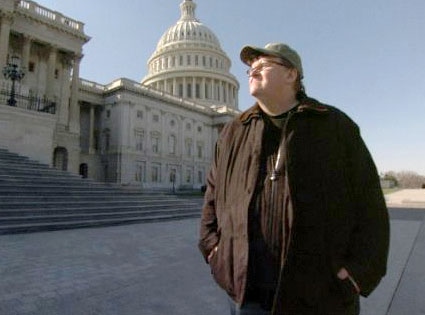 Paramount Vantage
Paramount VantageReview in a Hurry: In a mere two hours, polarizing documentarian Michael Moore attempts to explain the entire U.S. economy in layman's terms and why it's putting the hurt on most of us right now. There's less obvious grandstanding than in a usual Moore movie, and you don't have to agree with his take to appreciate some of the information herein.
The Bigger Picture: Michael Moore movies actually have a lot in common with Tyler Perry movies. Both lure the viewer in with the expectation of some comedically righteous outbursts from a funny fat person. This is all in order to ease you into a far more depressing story about suffering people, with the end goal being to convert you to the director's philosophy—Christianity in Perry's case, populist liberal activism in Moore's.
Both directors also despise and demonize corporate climbers who have forgotten their community roots. (Rich people who do occasionally give back, like, say, the directors themselves, are OK).
So it won't surprise you to know that, as predictably as Madea yelling, "I know you did not just say that to me!" Moore once again tries to get into places he isn't supposed to be, bullhorn and camera in tow. He also once again finds a way to tie everything back to his hometown of Flint, Mich.—it has become ground zero for the mailing out of foreclosure notices.
But these are obligatory greatest hits in the service of newer, more ambitious material: This time around, he wants to instigate a massive popular revolt against capitalism itself.
It isn't entirely clear what he'd replace it with; however, the movie's thesis is that "democracy" is the antidote, but his description of such merely involves workers having partial control of their own company. Yet presumably the company would still need to make money, and that is still capitalism by most definitions.
But even if you don't think capitalism should be scrapped, we can agree that there are numerous abuses of the system that need to be stopped, and Moore does a great job of trying to document them.
There are the "dead peasant" insurance policies that big companies secretly take out on their employees to profit from their deaths. The for-profit juvenile detention center that covertly collaborated with a judge to fill the prison with minor offenders who never got a fair trial. The inability of any accountants Moore can find to explain "derivatives" in plain language. And the manipulative tactics used to sell poor people on home refinancing plans that can change with no notice and end in foreclosure.
Whether you see these as aberrations or endemic symptoms, the movie should inspire audiences to do more of their own homework, be more skeptical and get more vocally involved with government. Whatever your core beliefs, this is a useful message.
The 180—a Second Opinion: No matter how much Moore's deadpan comedic voice-over jazzes things up, the movie does start to drag a bit about an hour and a half in, though it picks up again by the end. And what's up with interviewing Wallace "Inconceivable!" Shawn as though he were an expert on free markets?
_________
See how the first lady dresses for the times in our Fashion Spotlight: Michelle Obama